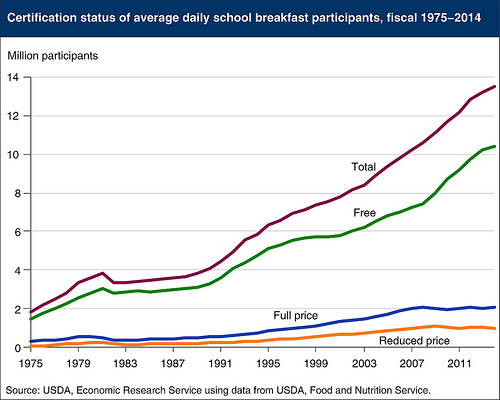WASHINGTON, D.C. – Federal officials are patting themselves on the back for increasing dependence on the national school breakfast program, citing explosive growth with free meals in particular.
Data released by the Economic Research Service shows the U.S. Department of Agriculture’s School Breakfast Program currently serves about 13.5 million students in about 90,000 schools nationwide, statistics that have more than doubled since 1996.
“Throughout the history of the School Breakfast Program, the number of participating children was considerably smaller than in the National School Lunch Program and is still less than half. Nevertheless, as the breakfast program finding increased – and grants to schools to help start up the program became more available – the number of schools participating in the breakfast program has steadily grown, making it available to more students,” according to a USDA blog.
The ERS data is displayed in a “Charts of Note” series that highlights research on food assistance and other topics, and was undoubtedly chosen because of the striking exponential rise in free and total lunches served to students since the program was founded in 1975.
The program launched with roughly 2 million total participants, with about 1.5 million going toward free food and the rest toward reduced or full priced meals. By 1995, total participation had eclipsed 6 million with about 5 million in free meals. Last year the program provided food to more than 13.5 million students, including more than 10 million free meals, according to the ERS chart.
“A notable increase in the free and reduced-price share in both (the breakfast and lunch) programs in recent years likely reflects more children qualifying and choosing to participate during the 2007-2009 recession, along with policy changes that have simplified the process of program qualification,” the USDA blog opines.
Those policy changes can have a profound impact on participation. In recent years the USDA has expanded eligibility qualifications to allow for “community eligibility” in places where a high proportion of students qualify for free or reduced priced meals.
In those places, all students receive free meals from the government, as long as schools comply with very strict regulations on calories, fat, sugar, sodium, whole grains, and nutrition restrictions championed by first lady Michelle Obama.
And there’s also the breakfast in the classroom program that’s becoming increasingly popular in many school districts. Teachers in some school districts, however, have resisted that program because it cuts into class time and creates sanitation issues with younger students.
Cynthis Schaefer, superintendent in Keyes, California told the Ceres Courier the district implemented the program for a year by she canceled breakfasts in the classroom after teachers complained and the local teachers union filed a grievance.
“There are a number of issues to be worked out regarding the program, including employment issues that need to be negotiated with the teachers union,” she said.
In other places, like the UCLA Community School, parents have lead a revolt against the breakfast in the classroom program because they believe it’s offensive to parents and wastes valuable instructional time.
“They say if kids don’t eat they won’t learn,” mother Lilian Ramos told the Associated Press. “The truth is that many of our kids come to school already having eaten. They come here to study.”
The federal school food programs are also getting a boost from liberal lawmakers who seem determined to steer their constituents toward dependency.
“State legislation in the form of AB 1240 authored by Asseblymen Rob Bonta, D-Oakland, and Tony Thurmond, D-Oakland, is seeking to take such issues out of local control by mandating that lower income districts be forced to participate in Breakfast in the Classroom,” the Ceres Courier reports.
And there’s little question why. As the Food Research and Action Center points out, “it pays” to serve government meals.
“For the 2015-2016 school year, CACFP sponsors receive $1.66 for each breakfast served, $3.07 per lunch or dinner served, and $0.84 per snack. CACFP sponsors can additionally choose to receive the value of commodities (or cash in lieu of commodities), $0.2375 for July 2015 through June 2016, for each lunch and dinner served, which would total about $3.31 per lunch or dinner served,” a FRAC fact sheet reads.



